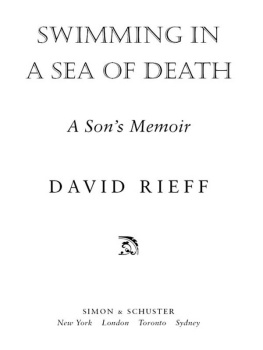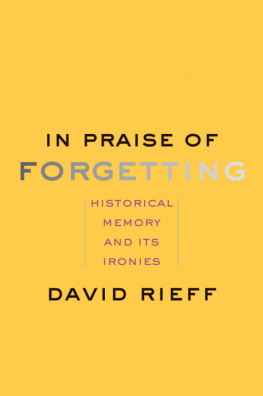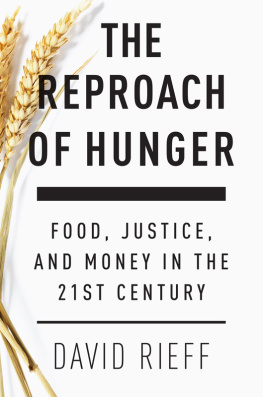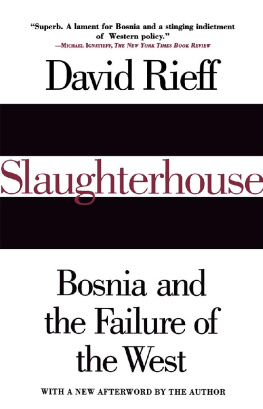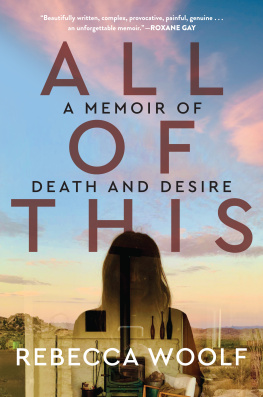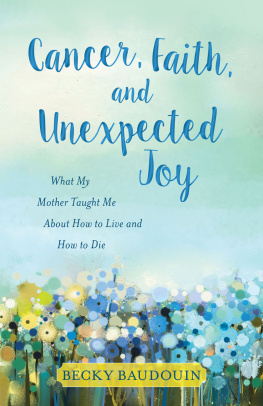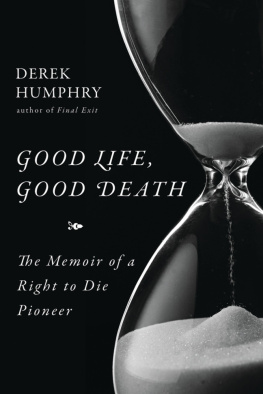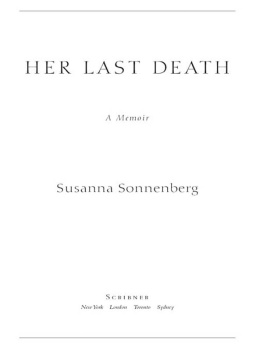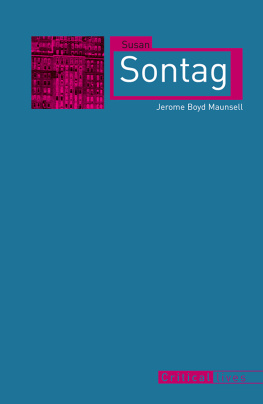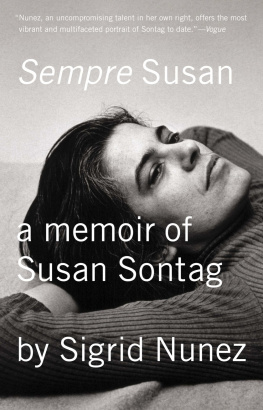ALSO BY DAVID RIEFF
At the Point of a Gun: Democratic Dreams and Armed Intervention
A Bed for the Night: Humanitarianism in Crisis
Crimes of War: What the Public Should Know (with Roy Gutman)
Slaughterhouse: Bosnia and the Failure of the West
The Exile: Cuba in the Heart of Miami
Los Angeles: Capital of the Third World
Going to Miami: Exiles, Tourists and Refugees in the New America

S IMON & S CHUSTER
1230 Avenue of the Americas
New York, NY 10020
Copyright 2008 by David Rieff
All rights reserved, including the right to reproduce this book or portions thereof in any form whatsoever. For information address
Simon & Schuster Subsidiary Rights Department,
1230 Avenue of the Americas, New York, NY 10020
S IMON & S CHUSTER and colophon are registered trademarks of Simon & Schuster, Inc.
Library of Congress Cataloging-in-Publication Data
Rieff, David.
Swimming in a sea of death: a sons memoir / by David Rieff.
1st Simon & Schuster hardcover ed.
p. cm.
1. Susan Sontag, 19332004. 2. Authors, American20th centuryBiography. 3. CancerPatientsBiography. 4. Mothers and sonsUnited StatesBiography. 5. MothersDeath. 6. Rieff, David. I. Title.
PS3569.O6547Z85 2008
818'.5409dc22
[B] 2007042887
ISBN-13: 978-1-4165-5428-8
ISBN-10: 1-4165-5428-9
Excerpt from Aubade from Collected Poems by Philip Larkin. Copyright 1988, 2003 by the Estate of Philip Larkin. Reprinted by permission of Farrar, Straus and Giroux, LLC. Excerpt from Sloan-Kettering: Poems by Abba Kovner, translated by Eddie Levenston. Copyright 2002 by the Estate of Abba Kovner. Foreword copyright 2002 by Leon Wieseltier. Reprinted by permission of Schocken Books, a division of Random House, Inc. Excerpt from When in my White Room at the Charit from Bertolt Brecht: Poems 19131956 by Bertolt Brecht, edited by John Willett and Ralph Manheim, with the co-operation of Erich Fried. Routledge 1997. Reprinted by permission of the Taylor & Francis Group. Excerpt from The Complete Poetry: A Bilingual Edition by Csar Vallejo, edited and translated by Clayton Eshleman. With a Foreword by Mario Vargas Llosa, an Introduction by Efran Kristal, and a Chronology by Stephen M. Hart. Copyright 2007 by The Regents of the University of California. Reprinted by permission of the University of California Press.
Visit us on the World Wide Web:
http://www.SimonSays.com
For Miranda
Because I know that time is always time
And place is always and only place
And what is actual is actual only for one time
And only for one place
I rejoice that things are as they are and
I renounce the blessd face.
T. S. E LIOT
Ash Wednesday, 1930
I
N OTHING could have been further from my mind. I thought that I was returning to my home in New York at the end of a long trip abroad. Instead, I was at the beginning of the journey that would end with my mothers death.
To be specific, it was the afternoon of March 28, 2004, a Sunday, and I was in Heathrow Airport in London on my way back from the Middle East. After almost a month moving back and forth between East Jerusalem and the West Bank (I had been writing a magazine story about the Palestinians in the last period of Arafats rule), I was relieved to be going home, and now I was halfway there. Other than that, though, my mind was pretty much a blank. The trip had been frustrating and I had only partly succeeded in getting what I needed. I knew that writing up the story was bound to be difficult. But I was tired, and both a little burnt out and a little hung over, and I was not yet ready to try to turn my reporting into writing. That could wait until I got home, and so instead, in the United Airlines lounge, I began making phone callsreconnecting with home as has always been my habit once I am through reporting a story. That was when my mother, Susan Sontag, told me that there was a chance that she was ill again.
My mother was clearly doing her best to be cheerful. There may be something wrong, she finally told me after I had gone on at far too great length about what the West Bank had been like. While I had been away, she said, she had gone in for her twice-yearly scans and blood teststhe regular routine that she had been following since her surgery and subsequent chemotherapy for the uterine sarcoma she had been diagnosed with six years earlier. One of the blood tests theyve just run doesnt seem so good, she said, adding that she had already had some further tests done, and asking me if I would come with her the following day to see a specialist who had been recommended to her and who had done some follow-up tests a couple of days earlier. He would have the conclusive results then. Its probably nothing, she said, and reminded me of the long list of false alarms that had come up in the aftermath of both her sarcoma and the radical mastectomy she had undergone after being diagnosed with advanced breast cancer in 1975.
She repeated that it was probably nothing. Inanely, I repeated it, too. We were agreed on that, we told each other. In theory, at least, it wasnt completely irrational for us both to say this. None of those false alarms had ever amounted to anything, had they? There had been that time when a scan had revealed something in her left kidney. It, too, had looked like cancer, but in the end it had turned out that my mother simply had an oddly shaped kidney. Then there had been the time when my mothers doctors worried that a sudden onset of severe stomach cramps might mean colon cancer. Those fears, too, had proved groundless. And having lived, as everyone who has had cancer does, with this sword of Damocles of a recurrence over her head since she contracted her first cancer in her early forties, my mother had learned the hard way to be calm when she received such news, or, at least, to act calmly. This, too, would be a false alarm, we each said again. Hadnt we been over this ground before? But our words were like shallow breaths and our composure built of numbness rather than calm. Im ashamed to say that I was relieved when we rang off.
Afterward, I tried not to think of anything, staring out at the runways of Heathrow, watching the planes land and take off, until I heard the boarding call for my own flight. Once on the plane, I got drunk, but then I always do. After we landed, I went home. When I arrived, I called my mothers apartment, but it was a friend of hers who answered and she told me that my mother was sleeping. I said I was going to do the same. And did. The alternative was screaming with the pain of believing that this time there might be no reprieve. I cant even imagine what it must have been like for her.
The following morning, I went to collect my mother at her apartment. Far from being rested, it was immediately obvious to me that she had not slept. Thinking back, I remember her frantic cheeriness, and my only partly successful efforts to mimic it. I say partly successful because, although I was able to remain calm, there already seemed to be the tiniest pause between my saying something and my hearing myself say it. Thinking back, I wish Id hugged her close or held her hand. But neither of us had ever been physically demonstrative with the other, and while much has been said and written about how people transcend their pettier sides in crises, in my experience, at least, what actually happens is that more often we reveal what lies beneath the waterline of what we essentially are. What my mother and I shared were words and yet now they felt all but valuelesslike Confederate dollars or Soviet roubles. I do not remember my own fear, but I remember vividly imagining hers. And yet she kept on talking about the Middle East, and, unable to say anything that mattered, let alone touch her, I kept on telling stories about Yasir Arafat and his compound in Ramallahas if that mattered anymore. This conversation went on until we arrived at the specialists officeor, more precisely, the leukemia specialists office.

